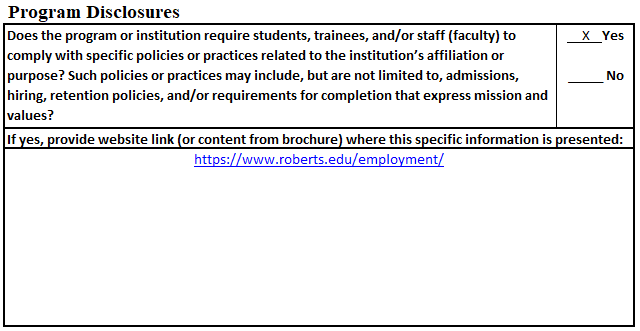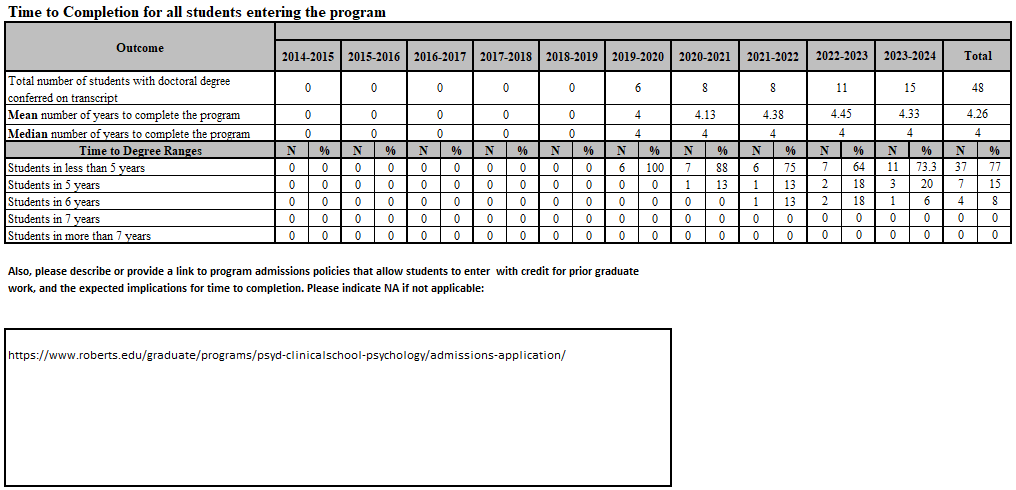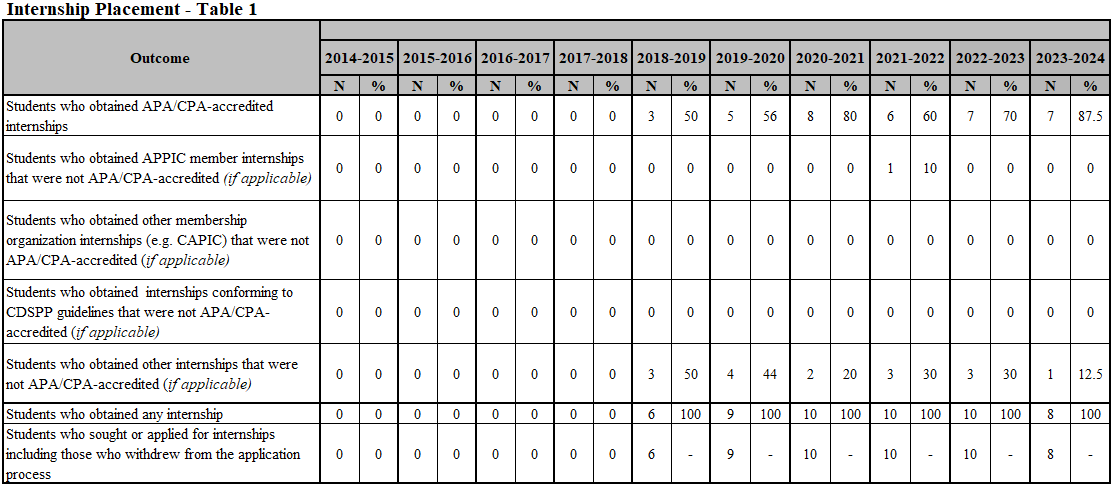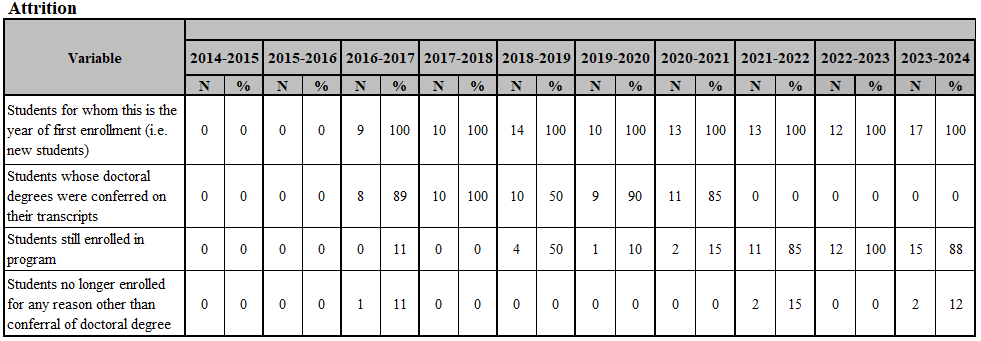- Bachelor's degree from a regionally accredited institution
- Cumulative grade point average (GPA) of at least 3.00 on a scale of 4.00
- Psychology major preferred, but students from a liberal arts background with coursework in statistics, research methods, and 15-18 hours in Psychological Studies will also be considered
- Competitive GRE scores (no established cut-offs) - Roberts Institution Code is 2759
- Evidence of professional and personal dispositions necessary for success in the program
Student Admissions, Outcomes, and Other Data







Admissions, Cost, and Scholarships for PsyD Program
To apply for the Psy.D. program at Roberts Wesleyan University, you must provide:
- Official transcripts from every college or university you attended. NOTE: All official transcripts can be sent via mail to Roberts Wesleyan University "ATTN: AGE Admissions Office" 2301 Westside Drive Rochester, NY 14624.
- Three recommendation letters (two academic and one professional reference)
- A typewritten autobiographical statement
- Official GRE scores
- A current professional résumé
- Submit your application online.
Transfer Credits
Up to 30 graduate credits earned in accredited graduate schools and carrying a grade of B or better will be transferable toward an advanced degree at Roberts Wesleyan University to the extent that the student can demonstrate equivalence to course(s) in the Roberts degree program and pending approval by the Psychology Department. This equivalence can be demonstrated by students providing the Department and their advisors with catalog course descriptions, course syllabi, and completed assignments for the courses being considered for transfer.
Decisions regarding credit transfer are made independent of admissions decisions.
Housing For This On-Campus Program
If you are in need of housing while studying at Roberts, please contact Admissions@roberts.edu for a list of housing options near campus or visit www.roberts.edu/student-life/residence-life/graduate-on-campus-housing/ for on-campus housing for full-time, graduate students.
The 2024-2025 cost per credit hour for this program is $1,250 per credit.
With 102 credit hours in the program, total cost to complete the program before scholarship(s), financial aid, or other benefits is: $127,500.
Fees vary by program and cost is subject to change each academic year.
Note: Roberts Wesleyan University reserves the right to change the fees above at any time without prior notice.
Every student accepted into the program will receive the PsyD Clinical/School Psychology Scholarship in the amount of $30,000.
Federal Aid - Students must be admitted and registered for at least 3 semester hours in a program leading to a graduate degree. Students may not owe a refund on any federal grant or be in default on any federal loan. A financial aid transcript is required from each institution where the student has previously been enrolled whether or not financial assistance was received at that institution.
- Direct Unsubsidized - Fixed rate loan with an annual maximum of $20,500. Rate and fees determined annually. For more information, go to www.studentloans.gov.
- GRAD PLUS - Fixed-rate credit qualifying loans that allow for additional funds to help pay for educational expenses, up to the Cost of Education, as established by Roberts Wesleyan University. The PLUS request process, including credit check, can be completed at www.studentloans.gov.
- Direct Loans - To determine eligibility, complete your FAFSA (Free Application for Federal Student Aid) at www.fafsa.ed.gov, or download the new FAFSA App (Google Play or Apple (iOS) Store) to complete it on your mobile device, each year. (Available October 1st for the following academic year). The Federal school code for Roberts is 002805.
Veterans - Roberts Wesleyan University participates in the Post-9/11 Veterans Education Assistance and Yellow Ribbon Programs. For more information regarding educational programs for Veterans, please visit www.GIBill.va.gov. Veterans Tuition Awards (VTA) are also available for eligible veterans in New York State. Contact HESC for more information at 1-888-697-4372 or www.HESC.com.
Employee Reimbursement - Many companies and businesses offer tuition reimbursement for their employees enrolled in college educational programs. Prospective students should contact the personnel offices at their places of employment for information about tuition reimbursement. Anticipated benefits must be reported on the Payment Agreement form.
GI Bill® is a registered trademark of the U.S. Department of Veterans Affairs (VA). More information about education benefits offered by VA is available at the official U.S. government Web site at www.benefits.va.gov/gibill.
Racial/Ethnic Diversity in Clinical and School Psychology ASSIST Scholarship
The scholarship reflects Roberts Wesleyan University's commitment to increasing racial and ethnic diversity in the field of psychology. The scholarship provides a one-time financial award for the first year of study.
Scholarship recipients are selected based on evidence in their application and interview on the following criteria:
- academic merit
- alignment with the goals of the discipline of clinical and school psychology
- representing an underrepresented racial or ethnic minority population
All tuition and fees must be paid prior to the beginning of the term, except in cases where an extended payment plan has been arranged.
-
Financial Aid is applied at the beginning of each term.
-
Payments can be made online at www.roberts.edu/payment with QuikPay.
IMPORTANT NOTE: Your financial aid eligibility may be impacted by your age and dependency status. If you are under the age of 25, you may be considered a dependent of your parents for Federal financial aid purposes. Dependent students are required to provide certain parental information on the FAFSA, including income, which will be used to determine your financial aid eligibility and may result in reduced levels of aid. New York State also has separate guidelines for dependency.
Program Aims
Program Aim One
To prepare doctoral level practitioners of health service psychology who can ethically deliver effective, evidence-based psychological services in a variety of settings with diverse populations.
- The program is designed to ensure that students have attained the necessary discipline-specific knowledge that provides a foundation for the practice health service psychology, including graduate level knowledge of:
- History and Systems of Psychology
- Affective Aspects of Behavior
- Biological Aspects of Behavior
- Cognitive Aspects of Behavior
- Developmental Aspects of Behavior
- Social Aspects of Behavior
- Advanced Integrative Knowledge of Basic Discipline-Specific Content Areas
- Research Methods
- Quantitative Methods
- Psychometrics
- The program is designed to ensure that students have attained the necessary profession-wide competencies for the practice of health service psychology, including competencies in:
- Research
- Ethical and legal standards
- Individual and cultural diversity
- Professional values and attitudes
- Communication and interpersonal skills
- Assessment
- Intervention
- Supervision
- Consultation and interprofessional/interdisciplinary skills
Program Aim Two
To prepare practitioners who can articulate how religion and worldview intersect with psychological concepts, with a particular emphasis on the Christian faith.
- A view of spirituality and religion as important aspects of human diversity
- An ability to identify spiritual and religious experiences, practices, and beliefs that have the potential to positively and negatively impact psychological health
- Knowledge of how to effectively provide psychological services to clients from diverse spiritual and/or religious backgrounds, affiliations, and levels of involvement
Want more information about this program?
Download a program guide with detailed information on cost, courses, and outcomes

Research Philosophy
The mission of the program is to prepare practitioners of health service psychology who can ethically deliver evidence-based psychological services to diverse populations in both clinical and school settings, and who can integrate the science and practice of psychology with principles of the Christian faith.
This focus on preparing students for the practice of health service psychology with diverse populations is reflected in our practice-based research model. The program seeks to bridge the gap between research and clinical practice, teaching students to value research-based clinical practice, to be effective consumers of psychological research, and to become evidence-based practitioners.
The research sequence and dissertation requirements were designed to promote the utilization of research in addressing applied problems relevant for the professional practice of clinical/school psychology. Applied research projects have pragmatic goals of addressing practical problems with insights drawn from psychological science. The focus on using research to inform and improve services to vulnerable populations is entirely consistent with the Christian heritage and mission of our program.
Thus, the dissertation requires the completion of a project related to the applied practice of clinical/school psychology and the demonstration of the ability to bridge the gap between research and practice. The projects will have a heavy focus on making an impact on the practice of clinical or school psychology. A variety of types of projects can be acceptable, including intervention projects, program evaluation, survey projects, systematic investigation of a problem, program or service development project, etc. Applied research projects may utilize a variety of research designs, including qualitative, quantitative or mixed method paradigms.
Clinical or School Research
Our goal is to help students not only demonstrate their competency in research, but also to develop a personal valuing of the use of research to inform the professional practice of psychology.
The dissertation occurs simultaneously with the School Psychology Internship, and many students will choose to focus on a research issue relating to their school setting. The program has developed partnerships with large, diverse school districts who welcome the opportunity to have doctoral students engage in practice as interns and conduct research in their school district.
Other students may wish to develop research ideas relating to experiences in clinical placement sites. The issue or problem of focus for the project will be identified by the student in consultation with program faculty, and with input from internship site administrators as appropriate. Initial steps in the dissertation process will be supported by two research methods classes to provide structure and feedback.
Competencies Demonstrated
The research and dissertation sequence is designed to systematically develop the following competencies:
APA
- Quality and rigor to have the potential to contribute to the scientific, psychological, or professional knowledge base.
- Conduct research or other scholarly activities.
- Critically evaluate and disseminate research or other scholarly activity via professional publication and presentation at the local (including the host institution), regional, or national level.
NASP
- Demonstrate the ability to evaluate and use research methods, statistics, and program evaluations to gather data about school systems, programs, and classroom environments.
- Demonstrate the ability to understand current research in the field that is directly applicable to her/his functioning as a professional School Psychologist.
- Demonstrate the ability to evaluate the effectiveness of interventions and prevention practices.
Faculty Mentorship
Once a student has submitted a draft of their concept paper to the instructor of DPSY 6010, a faculty member in the doctoral program will be appointed to serve as their dissertation committee Chair. This appointment will be based on the interests, expertise, and availability of faculty. The committee member(s) are selected because they have expertise and interest in the topic or methodology. The reader works with the dissertation chair to mentor the student and ensure the quality of the research.
Writing the dissertation manuscript and the defense of that manuscript is typically done during the student’s final year in the program. A dissertation is not complete until the Roberts Wesleyan University Golisano Library accepts it for publication.
Further details about the process are reviewable in the Roberts Wesleyan University PsyD Clinical Dissertation Manual.
For a complete listing of published dissertations, click here.
Listed is a sampling of research done by faculty and students. Each semester the department hosts a Graduate Brown Bag Lunch Discussion for students. This is an opportunity for students to gather and discuss dissertation topics, research, and current issues around psychology.
PsyD Candidate, Megan Scroger, Presents at International Conference!
Professor Bascoe and PSYD Students Present at CAPS Conference!
The Doctoral Program in Clinical/School Psychology follows a practitioner-scholar training model, equipping students with the knowledge, skills, and attitudes necessary for competent clinical practice. Our program is grounded in the philosophy that the training of professional psychologists is a developmental process that must foster the acquisition of foundational knowledge, clinical skills, and attitudes and values necessary for life-long learning and competent clinical practice. The Christian heritage of our program manifests in our commitment to ensure that students are equipped to professionally serve diverse and underserved populations with a high level of integrity and professionalism.
The Doctoral Program of Roberts Wesleyan University has been fortunate to have a number of committed schools, agencies, hospitals, and Field Supervisors who provide supervision, mentoring, and role modeling to our students. This includes the community-based training clinic, Westside Psychological Services, overseen by the psychology faculty at Roberts Wesleyan University. The graduate programs have a designated full-time Field Director to assist students through the field experience.
Our Field Supervisors’ commitment to the fields of School Psychology, Clinical Psychology, and Mental Health Services, and to sharing their knowledge and experience is essential to the professional development of our students. Clinical training begins in the first semester of the program, with a gradual introduction to the responsibilities of a health service psychologist. Clinical training encompasses the development of knowledge and competencies within traditional classes and an extensive field training component that complements classroom learning.
Field Education Sequence
The field experience program has been designed in conjunction with the didactic course sequence, to allow students to apply what they are learning, further develop knowledge and skills introduced in the classroom setting, and develop their professional dispositions and identity. Experiences in the field are sequenced to provide progressive, varied training. The table below outlines the field program.
Developmental Clinical Training Objectives
Year One: Introduction of Foundational Clinical Skills
Socialization to health service psychology (focus on areas of clinical and school)
Foundational scientific knowledge
Clinical Interviewing and diagnosis
Intervention foundations
Assessment foundations
Year Two: Development of Clinical Skills
Foundations of intervention and assessment skills through practicum experience
Integration of theory and practice
Foundational understanding of individual and cultural diversity in relation to clinical practice
Foundations of legal and ethical standards to clinical practice
Foundations of evidence-based intervention skills
Year Three: Consolidation of Clinical Skills
Development of intervention and assessment skills through practicum experience
Advanced Integration of theory and practice
Continuing development of competencies relating to individual and cultural diversity
Development of ability to apply legal and ethical standards to clinical practice
Development of evidence-based intervention skills
Conceptual integration of psychology and principles of the Christian faith
Year Four: Development of Professional Identity
Theory and skill development in consultation
Theory and skill development in supervision
Advanced development of skills in assessment, diagnosis, case conceptualization, intervention, and case conferences
Development of research competencies relating to clinical/school issues
Year Five: Transitioning to Professional Leadership Role
Consolidation of clinical skills during internship
Professional identity consolidation
Development of skills in consultation, supervision, and advocacy
2016-2023 Practicum Experiences
- College/University Wellness Centers
- Community Mental Health clinics
- Forensic/Correctional Facilities
- Hospital/Medical Centers
- Private Practices
- Schools K-12
- Neuropsychological Institutes
- Veterans Affairs Hospitals/Centers
- Child Residential Treatment Centers
The pre-doctoral internship represents the culminating experience for students in the PsyD program. Its purpose is to provide intensive, supervised experience in the roles and functions of the practicing psychologist, as well as to provide a broad exposure to the educational and community environment of the internship site. The internship may occur on a full-time basis over a period of one academic year or on a half-time basis over a period of two consecutive academic years.
The ideal internship provides a balance between breadth and depth of experience. This growth experience requires regular and consistent contact with supervisors, which in turn allows for the natural evolution of the intern from student to professional.
Applying for an Accredited Pre-Doctoral Internship
Students have options for completing their pre-doctoral internship. Students are expected to complete internships that are accredited by the American Psychological Association, or that meet the Association of Psychology Postdoctoral and Internship Centers (APPIC) member criteria. APPIC criteria and other information can be found at http://www.appic.org. These internships are high quality training experiences that are paid and are available nationally. Faculty support is provided to students throughout the application process. Students at Roberts have been highly successful obtaining accredited internships.
Applying for a Designed Pre-Doctoral Internship
Although students are encouraged to seek internships through the APPPIC process, the program recognizes that this will not be possible for all students. Because few APA approved school psychology internships exist, students who wish to complete their internship in a school setting may need to find an internship outside of this process. Some students may wish to combine a clinical site with a school site for a specialized internship that fits their interests. Additionally, APA accredited internships are highly competitive and often involve relocation. For students who are unable to relocate, a local internship can be developed in consultation with the program.
Partial Summary Statistics 2020-21 Internship
| Outcome | Number of Students | Percent |
|---|---|---|
| Students who sought or applied for internships | 9 | 100% |
| Students who obtained internships | 9 | 100% |
| Students who obtained paid internships | 7 | 77% |
| Students who obtained APA/CPA accredited internships | 5 | 55% |
| Students who obtained other internships that were not APA/CPA-accredited | 4 | 45% |
The PsyD and MS School Psychology programs are approved by The New York State Board of Regents and fully accredited by the National Association of School Psychologists (NASP) through August, 2030.
Masters in School Psychology Program Annual Report and Student Outcomes Data https://apps.nasponline.org/standards-and-certification/graduate-education/index.aspx?id=958221
Additionally the PsyD program is fully accredited by the American Psychological Association (APA) through November, 2033.
https://accreditation.apa.org/contact
We are also currently a Doctoral Program Associate (DPA) member of the Association of Psychology Postdoctoral & Internship Centers (AAPIC).
Roberts Wesleyan University is accredited by the Middle States Association of Colleges and Schools, and is a member of the Association of Colleges and Universities of the State of New York, Rochester Area Colleges, Rochester Regional Library Council, the Association of Free Methodist Educational Institutions, the Council of Independent Colleges and Universities, and the Coalition of Christian Colleges and Universities.

Questions?
Meet Your Enrollment Representative!
Jim Sheets
Director of GPS Recruiting and Strategic Initiatives
Faculty

Professor of Psychology; PsyD Program Director and Traditional Undergraduate/Graduate Program Co-Director
Send Email
585-594-6483

Professor of Psychology; Department Chair and Traditional Undergraduate/Graduate Program Co-Director
Send Email
585-594-6185
Staff

Program Manager, Department of Psychology; Operations Manager, Westside Psychological Services
Send Email
585-594-6624















